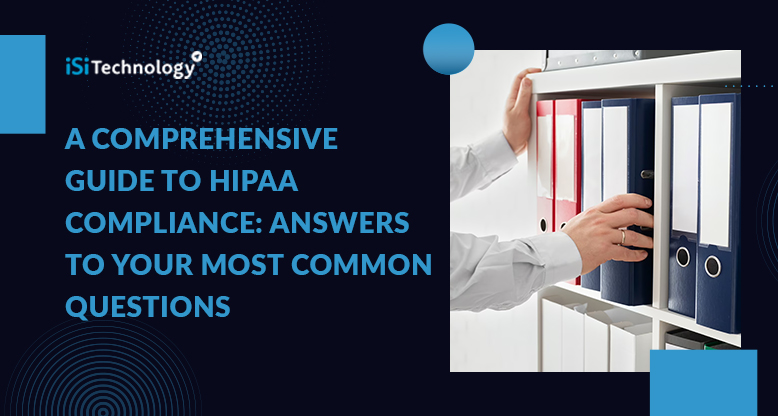A Comprehensive Guide to HIPAA Compliance: Answers to Your Most Common Questions

The United States federal law mandates the protection of all medical data so that patients get equal access to healthcare and insurance coverage. The Health Insurance Portability and Accountability Act (HIPAA) in 1996 was created for this.
This act prevents the sharing of certain healthcare information with insurers through its privacy and security rules.
Even today, many healthcare providers, professionals, and other entities still need clarification about many elements of this privacy act. This practical guide answers some frequently asked questions about HIPAA compliance that will hopefully put your doubts to rest.
This guide outlines details all you need to know about the complex and challenging world of HIPAA compliance.
Let’s dive in.
How to Become a HIPAA Compliance Officer
No specific educational or professional qualification is required for HIPAA compliance officers. However, most healthcare facilities prioritize job applicants with degrees in health information technology, healthcare administration, or medical coding.
If you wish to train to become a HIPAA compliance officer, you can find many training courses on the subject. But you’ll have to select an education provider that offers the specific training you’re looking for. For this, look up the course content and ensure that it’s relevant to your preferred job role.
Some courses delve extensively into HIPAA’s security rules and less into privacy and breach notification, whereas others do the opposite. This leaves gaps in education and training.
How to Charge for a HIPAA Compliance Assessment
If you’re conducting a HIPAA compliance assessment for a covered entity (CE), you will need to charge for it accurately.
Keep the following factors in mind when creating a quote for your client:
- The nature of the business
- The organization’s size and location
- If the client needs to set up a dedicated HIPAA compliance department
- The depth of the risk assessment
- The extent of implementation of data security measures, business processes, and systems
- If there is a need for a physical site review
- The number of business associates
- The number of systems in scope
Business associates in the healthcare industry often need to focus only on the security rule. As they aren’t CEs, the privacy rule does not apply. CEs have to follow the privacy rule, which increases the cost of the assessment.
These factors and internal needs determine the costs of compliance. Typically, HIPAA compliance for small CEs can run up between $4,000 and $12,000. Meanwhile, compliance bills for larger CEs can go up to $50,000 or even a few hundred thousand dollars.
How to Certify Whether a Healthcare Provider or Associate is HIPAA Compliant
There is currently no HIPAA certification that can prove HIPAA compliance. This means a healthcare provider or associate must assess their organization against HIPAA rules by performing a thorough organizational audit.
They can use the United States Department of Health and Human Services (HHS) Office of Civil Rights (OCR) HIPAA Audit Protocol to help them in this process. This protocol specifies the policies and procedures that must be followed for compliance.
The organization must also check if its policies and procedures fulfill all HIPAA regulations and ensure proper policy implementation.
Keep in mind that a provider or business associate can perform a HIPAA compliance review internally or through an independent external organization. If they opt for an internal review, it must be performed by a professional independent of the processes under consideration. They must also provide proof in support of their conclusions.
In contrast, an external audit by an independent third party provides better support for an organization’s clients. It generates documentation that the organization can present to its clients to prove its HIPAA compliance. This helps the organization build trust and credibility and set itself apart from its competitors. It also reduces the time spent answering clients’ security questions.
Note that HIPAA compliance is a continuous process, not a one-time event. This means organizations must validate the results of their audits at least once every year to ensure continued compliance with these important regulations.
If you need to evaluate a vendor for HIPAA compliance, verify their compliance and make sure its standards meet yours. If they opted for an external review, ask them for evidence of the audit. This will confirm the validity of the review. You may also find gaps that may affect your business.
If the vendor has not performed an external review, assess their compliance before giving them access to Protected Health Information (PHI). You must do your due diligence before allowing third parties access to sensitive ePHI (electronic PHI).
How Do Doctors’ Offices Handle HIPAA Compliance?

Doctors’ offices need to follow the following five tips to comply with HIPAA regulations:
1. Maintain Data Privacy
Establish privacy parameters everywhere in your office, from the lobby to the patients’ examination rooms. You and your patients must be able to speak in private and maintain confidentiality at all times.
Create a comprehensive documentation system that will ensure privacy at all points of the process. Never leave your patients’ records lying around for anyone to see or pick up.
Doctors’ offices with ePHI must ensure that only authorized personnel can access sensitive information. Train your employees to adhere to HIPAA privacy rules.
Automation of business operations is the key to success for HIPAA compliance. So, make sure that you deploy a secure and state-of-the-art HIPAA software development solution.
BillPro is a leading customizable and web-based healthcare billing and electronic claim software that can help you file error-free medical claims. It also uses a safeguard to protect patients’ healthcare information.
2. Post a Disclaimer About Privacy Practices
Put up a disclaimer in your office clearly stating your privacy policy—the sign about your practices should be easily visible to your visitors. This will give them peace of mind that you have enforced the HIPAA privacy rule in your office.
You can also display information about the security systems you have in place to protect your patients’ data.
3. Draft and Follow Policies
Create a manual with all the HIPAA policies, protocols, and guidelines that you and your staff must follow. Include all relevant forms and codes of conduct in this manual.
This will be your guide for training your staff for compliance. All personnel must sign an acknowledgment of their HIPAA training.
Stay abreast of any amendments to HIPAA regulations and accordingly revise your manual and retrain your staff.
4. Train Staff Regularly
To avoid HIPAA violations and penalties, provide HIPAA compliance training annually. This will help them refresh their knowledge of the procedures and policies and impart any recent changes.
Record the date of each training session and the names of the employees who attended. Keep this information in your company records as proof of your organization’s continued compliance.
If you work with vendors and other associates, ensure that they, too, have received HIPAA training. This will help you ensure that all aspects of your operations remain HIPAA-compliant.
5. Perform Annual Assessments
Maintaining data security and privacy is an ongoing process. This is why doctors’ offices must perform risk assessments at least once annually. They can do this internally or choose a third party to conduct the evaluation.
How Long Does Your HIPAA Compliance Last?
Healthcare providers and business associates must maintain medical records for a minimum of six years for HIPAA compliance. This time frame begins either at the time of policy implementation or after the record’s creation, whichever is later.
Hospitals and large healthcare providers with full-time risk and compliance departments typically take two to three years to implement HIPAA compliance. Medium-sized healthcare providers need a year or two to develop and implement complete compliance systems from scratch.
Full-time employees working with single-location healthcare providers and business associates take at least six months to complete their compliance process from beginning to end.
How Much Does HIPAA Compliance Cost the Industry?

Many healthcare providers and associates appoint officers to look after various aspects of HIPAA compliance. These organizations have also adopted advanced technologies and software solutions to protect patients’ medical data. This has resulted in rising compliance costs for healthcare organizations.
Research company Gartner had projected that from 2003 to 2008, HIPAA would potentially cost the healthcare industry a minimum of $3.8 billion or even ten times that.
In December 2000, the American Hospital Association (AHA) reported that the initial five-year compliance cost impact on hospitals could be up to $22.5 billion. They added that the five-year cost of complying with the minimum requirements would be at least $1.3 billion. It could cost up to $19.8 billion to invest in new computer systems.
Meanwhile, HHS projected that CEs would have to cough up $17.6 billion over the first decade to implement the HIPAA privacy rule.
The real HIPAA compliance costs are projected to be around $8.3 billion annually. Moreover, each healthcare professional is estimated to spend $35,000 a year on average on health information technology maintenance.
It is difficult to determine exact compliance costs as they are hidden beneath layers of bureaucracy.
Conclusion
There is currently no formal HIPAA certification program in place. So, the onus lies on healthcare providers and their associates to provide customers and regulators with robust proof of HIPAA compliance. Organizations that do not proactively address loopholes in their business systems and gaps in compliance may be fined for breaches.
We know that HIPAA compliance can be cumbersome, and its costs are hefty. But fortunately, sophisticated software can come to your aid and minimize expenses. It can help you remain HIPAA-compliant, avoid violations and penalties, and keep your reputation and bottom line intact.
Moreover, HIPAA compliance has many benefits for you and your customers. It ensures the security and privacy of patient data and builds your brand image and trust.
ISI Technology provides healthcare providers and business associates with an impressive array of HIPAA-compliant customizable billing software. Our products include Medicaid billing software, NEMT billing software, and more.
If you wish to explore our cutting-edge technologies and software solutions, contact ISI Technology team for more information. You can also head to the official website and check out our various services.